Sigma Xi Distinguished Lecturers, 2009-2010
Abstracts
Each lecturer has designated his or her topic(s) for three different types of audiences. Where more than one level is shown, the lecture can be adjusted to the needs of the audience:
- P (Public)
Aimed at presenting scientific issues of general concern to a public audience.
- G (General)
Intended for a normal Sigma Xi audience of both scientists and other scholars representing a broad range of disciplines. - S (Specialized)
Aimed at scientists and students in fields that are closely related to that of the lecturer.
John F. Alderete
Vice Provost of Research, Washington State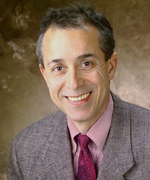 University
University
School of Molecular Biosciences
French Ad 324
Pullman, WA 99164
Phone: 509-335-9141
E-mail: alderete@wsu.edu
Web: http://molecular.biosciences.wsu.edu/faculty/alderete/
John F. Alderete, Ph.D. is Professor of Microbiology at the University of Texas Health Science Center at San Antonio. He received two B.S. degrees (mathematics and biology) from New Mexico Institute of Mining and Technology, Ph.D. in microbiology in 1978 from the U. Kansas-Lawrence, and postdoctoral fellowship at UNC-Chapel Hill. He has 125 publications and 54 book chapters and invited OP-ED editorials. He has given 400 presentations on the sexually transmitted agent, Trichomonas vaginalis, at universities and conferences. He has 6 patents and patents pending. He has been a member of study sections and panels for government agencies. Dr. Alderete has served on National Academy of Sciences Institute of Medicine panels. He speaks on issues involving minorities, higher education, and the scientific workforce. He has received honors, most notably the Premio Encuentro Award for Science and Technology in 1992, the single highest honor given to an Hispanic in America. He was elected into the American Academy of Microbiology. Hispanic Magazine selected him as one of the 100 Most Influential Hispanics in America. He conducted for over a ten-year period a Saturday Morning Science Camp for minority students, parents and teachers. He has mentored 40 underrepresented minorities from undergraduate institutions and high schools. Dr. Alderete was president of SACNAS, and he received the 2003 Distinguished Scientist Award presented at the SACNAS annual conference. ASM honored Dr. Alderete in 2004 with the William A. Hinton Award for bringing minorities into the sciences. He is the inventor for the diagnostic for the trichomonosis STD. Dr. Alderete was inducted into the Mexican Academy of Science in October 2006. Finally, he received the 2007 Outstanding Latino Faculty in Higher Education Research/Teaching in Higher Education award from the American Association of Hispanics in Higher Education, Inc.
Gary D. Christian
Professor of Chemistry Emeritus
University of Washington
Box 351700
Seattle, WA 98195-1700 United States
Phone: 425-454-9361
E-mail: christian@chem.washington.edu
Web:http://depts.washington.edu/chem/people/
faculty/christian.html
Gary D. Christian received his B.S. degree in 1959 from the University of Oregon and Ph.D. degree from the University of Maryland in 1964. He was a research analytical chemist at the Walter Reed Army Institute of Research, 1961 to 1967. He joined the University of Kentucky in 1967, and in 1972 moved to the University of Washington as Professor of Chemistry. He was Divisional Dean of Sciences in the College of Arts and Sciences, 1993-2001. Christian's research interests include electroanalytical chemistry, atomic spectroscopy, and flow methods of analysis. He is the author of over 300 papers and has authored books on: Atomic Absorption Spectroscopy; Trace Analysis; Analytical Chemistry (6 editions); Instrumental Analysis (2 editions); Problem Solving in Analytical Chemistry; and Quantitative Calculations in Pharmaceutical Practice and Research.
He was a Fulbright Scholar at the Université Libre de Bruxelles in 1978-79. His honors include the American Chemical Society (ACS) Division of Analytical Chemistry Award for Excellence in Teaching , the ACS Fisher Award in Analytical Chemistry, and the Université Libre de Bruxelles Medal of Honor, Talanta Gold Medal, Charles University Commemorative Medal, Deakin University Geoff Wilson Medal, Japanese Association for Flow Injection Analysis Scientific Honor Award Medal, Senior Scholar Award of the Thailand Research Fund, and the University of Ghent Honorary Certificate of Research. A special issue of the journal, Electroanalysis, was dedicated in his honor on his 65th birthday. He received an Honorary Doctorate Degree from Chiang Mai University and was made an honorary member of the Japanese Society for Analytical Chemistry. He is listed in over four dozen professional directories, including Who's Who in America, American Men and Women in Science, and Who's Who in American Education. Dr. Christian serves or has served on the editorial boards of eighteen journals. He has been Editor-in-Chief of Talanta since 1989.
David W. Frayer
Professor
University of Kansas
Department of Anthropology, KU
Fraser Hall, Room 622
1415 Jayhawk Blvd
Lawrence, KS United States
Phone: 785-841-716
E-mail: frayer@ku.edu
Web: http://www2.ku.edu/~kuanth/people/
faculty_frayer.shtml
David Frayer is a Professor in the Department of Anthropology, University of Kansas, Lawrence. With degrees from Miami University (BA, 1969), Case Western Reserve University (MA, 1971) and the University of Michigan (PhD, 1976) he has focused in European paleoanthropology and dental anthropology. His early research involved the internal dynamics and long-term evolutionary trends in European Upper Paleolithic and Mesolithic populations. For the past two decades he has extensively published (independently and with a variety of American and European scholars) on the relationship between Neandertal and subsequent European populations. Ongoing research concerns various projects about the Croatian Neandertal site of Krapina, the dental anthropology of an early, preceramic Neolithic site of Merhgarh in Pakistan, early Homo from Eritrea and the so-called 'hobbit" from Flores, Indonesia. He has published widely in national and international books and journals on topics ranging from Neandertal toothpick use to evidence for human massacres in the German Mesolithic to evidence for language origins.
Robert B. Gilbert
Hudson Matlock Professor in Civil, Architectural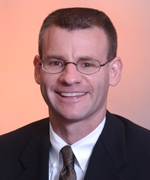 and Environmental Engineering
and Environmental Engineering
The University of Texas at Austin
Department of Civil, Architectural and Environmental Engineering
1 University Station C1700
Austin, TX 78712 United States
Phone: 512-232-3688
E-mail: bob_gilbert@mail.utexas.edu
Dr. Gilbert is the Hudson Matlock Professor in Civil, Architectural and Environmental Engineering at The University of Texas at Austin. He joined the faculty in 1993. Prior to that, he earned B.S. (1987), M.S. (1988) and Ph.D. (1993) degrees in civil engineering from the University of Illinois at Urbana-Champaign. He also practiced with Golder Associates Inc. as a geotechnical engineer from 1988 to 1993. His expertise is the assessment, evaluation and management of risk in civil engineering. Applications include building foundations, slopes, pipelines, dams and levees, landfills, and groundwater and soil remediation systems. He teaches undergraduate, graduate and professional level courses. He conducts research supported by federal and state agencies and private industry. Recent activities include analyzing the performance of offshore platforms and pipelines in hurricanes; managing earthquake and flooding risks for the Sacramento-San Joaquin Delta in California; and performing a forensic analysis of the New Orleans levee failures.
Michael F. Goodchild
Professor of Geography
University of California, Santa Barbara
909 West Campus Lane
Goleta, CA 93117 United States
Phone: 805-455-6529 E-mail:good@geog.ucsb.edu
Web: www.geog.ucsb.edu/~good
Michael F. Goodchild is Professor of Geography at the University of California, Santa Barbara, and Director of spatial@ucsb. He received his BA degree from Cambridge University in Physics in 1965 and his PhD in Geography from McMaster University in 1969. After 19 years at the University of Western Ontario, he moved to Santa Barbara in 1988. He was elected member of the National Academy of Sciences and Foreign Fellow of the Royal Society of Canada in 2002, and member of the American Academy of Arts and Sciences in 2006. He was Editor of Geographical Analysis between 1987 and 1990 and Editor of the Methods, Models, and Geographic Information Sciences section of the Annals of the Association of Americal Geographers from 2000 to 2006. He serves on the editorial boards of ten other journals and book series. His published books include Accuracy of Spatial Databases; Geographical Information Systems: Principles and Applications; Environmental Modeling with GIS; Scale in Remote Sensing and GIS; Interoperating Geographic Information Systems; Geographic Information Systems and Science; Uncertainty in Geographical Information; Foundations of Geographic Information Science; Spatially Integrated Social Science; GIS, Spatial Analysis, and Modeling; and Geospatial Analysis: A Comprehensive Guide to Principles, Techniques and Software Tools. In addition he is author of some 400 scientific papers. He was Chair of the National Research Council's Mapping Science Committee from 1997 to 1999, and currently chairs the Advisory Committee on Social, Behavioral, and Economic Sciences of the National Science Foundation. His current research interests center on geographic information science, spatial analysis, and uncertainty in geographic data.
Kimberly A. Gray
Professor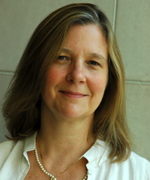
Northwestern University
Department of Civil & Environmental Engineering
2145 Sheridan Road
Evanston, IL 60208-3109 United States
Phone: 847-467-4252 E-mail: k-gray@northwestern.edu
Kimberly Gray is a Professor in the Department of Civil and Environmental Engineering, has a secondary appointment in Chemical and Biological Engineering and is a member of the Center for Catalysis and Surface Science, Institute of Policy Research and the Transportation Center at Northwestern University. She received her Ph.D. from the Johns Hopkins University in 1988 and worked as a research engineer for the Lyonnaise des Eaux in Paris, France for 2 years. She joined the Northwestern faculty in 1995 and since 2003 has been the Director of the Environmental Science, Engineering and Policy Program. She was recognized as a NSF Presidential Young Investigator, was the 1998-99 president of the Association of Environmental Engineering and Science Professors, and was the Associate Director of one of the first three NSF Environmental Molecular Science Institutes in the U.S., NU's Institute of Environmental Catalysis, from 1998-2005. In 2007 she received the McCormick Excellence Award in Research, Teaching and Citizenship. Her research focuses on the development of photoactive materials for energy and environmental applications, and on the study of chemical fate in environmental systems. She works closely with the Chicago Legal Clinic to provide technical expertise to solve environmental problems for low-income urban communities. Both her teaching and research are tightly interwoven with the many issues that underpin the drive toward sustainability. She is the author of over 60 scientific papers and lectures widely on energy and environmental issues.
Robert M. Hazen
Senior Scientist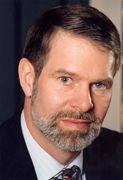
Carnegie Institution
Geophysical Lab
5251 Broad Branch Road NW
Washington, DC 20015 United States
Phone: 202-478-8962
E-mail: rhazen@ciw.edu
Web: www.hazen.ciw.edu
Robert M. Hazen, research scientist at the Carnegie Institution's Geophysical Laboratory and Clarence Robinson Professor of Earth Science at George Mason University, received the B.S. and S.M. in geology at the Massachusetts Institute of Technology (1971), and the Ph.D. at Harvard University in earth science (1975). After studies as NATO Postdoctoral Fellow at Cambridge University in England, he joined the Carnegie Institution's research effort, where his research focuses on the role of minerals in the origin of life.
Hazen is author of more than 300 articles and 19 books on science, history, and music. He has written widely for popular audiences, including articles inNewsweek, Scientific American, Smithsonian Magazine, New Scientist and The New York Times Magazine. A Fellow of AAAS, he received the Mineralogical Society of America Award (1982), the American Chemical Society Ipatieff Prize (1986), the ASCAP Deems Taylor Award (1989), the Educational Press Association Award (1992), and the Wood Science Writing Award (1998). He was President of the Mineralogical Society of America in 2005-2006.
Prof. Hazen is active in presenting science to a general audience. His books with coauthor James Trefil include the best selling Science Matters: Achieving Scientific Literacy and The Sciences: An Integrated Approach, now in its fifth edition. He serves on the Committee on Public Understanding of Science of AAAS, and on Advisory Boards for NOVA (WGBH Boston), Earth & Sky, Encyclopedia Americana, and the Carnegie Council. He appears frequently on radio and television programs on science, and he developed two popular video courses: The Joy of Science and The Origins of Life, produced by The Teaching Company. Robert Hazen is also a professional trumpeter who has performed with numerous ensembles including the Metropolitan Opera, the Bolshoi Ballet, and the National Symphony. He is presently a member of the National Philharmonic and the National Gallery Orchestra.
Evelyn L. Hu
Professor, School of Engineering and Applied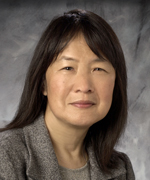 Science
Science
Harvard University
Engineering & Applied Science
Pierce Hall 113
Harvard University
29 Oxford St
Cambridge MA 02138
E-mail: ehu@seas.harvard.edu
Evelyn Hu is currently serves as the Gordon McKay Professor of Applied Physics and of Electrical Engineering at Harvard University. She received her B.A. from Barnard College in 1969 and her M.A. and Ph.D. from Columbia University in 1971 and 1975, respectively. She was employed at AT&T's Bell Laboratories from 1975 to 1984, when she joined UCSB as a full professor. She served UCSB's Department of Electrical and Computer Engineering as vice chair from 1989 to 1992 and as chair from 1992 to 1994. Hu has made major contributions to nanotechnology by designing and creating complex nanostructures. Her work has focused on nanoscale devices made from compound semiconductors and on novel devices made by integrating various materials, both organic and inorganic. She has also created nanophotonic structures that might someday facilitate quantum computing. Hu's seminal work in nanofabrication has included high-resolution patterning and high-resolution etching of circuits onto nanoscale materials. She has also developed biological approaches to nanotechnology, using biological assembly pathways to control the composition and structure of novel devices. Some of her research ideas led to her co-founding of Cambridge, Mass.-based Cambrios Technology, a start-up that is developing new, cost-effective materials of importance for electronic device applications. At UCSB, she has led the Institute for Quantum Engineering, Science and Technology, the National Science Foundation-funded Center for Quantized Electronic Structures and Center for Robotic Systems in Microelectronics, and the UCSB component of the NSF National Nanofabrication Users Network. Hu's honors include election as a fellow of the IEEE, formerly the Institute of Electrical and Electronics Engineers (1994), the American Physical Society (1995), and the American Association for the Advancement of Science (1998). She was elected to the National Academy of Engineering in 2002 and to the National Academy of Sciences in 2008.
Terry L. Hunt
Professor in the Department of Anthropology
University Of Hawaii-Manoa
Dept Of Anthropology/Saunders Hall 345
University Of Hawaii-Manoa
2424 Maile Way
Honolulu, HI 96822
Phone: 808-956-7310
E-mail: thunt@hawaii.edu
Web: http://www.anthropology.hawaii.edu/
faculty/hunt
Terry L. Hunt, is Professor in the Department of Anthropology at the University of Hawaii. He earned his Bachelor's Degree at University of Hawai`i, Hilo; his Master's Degree (First Class Honors) at University of Auckland (New Zealand); and his Ph.D. at University of Washington (1989). Dr. Hunt has taught at University of Hawai`i since 1988. His research and teaching are primarily in Pacific Island archaeology. Dr. Hunt has been conducting archaeological field research in the Pacific Islands for more than 30 years. He has done extensive work in the Hawaiian Islands, Fiji, Samoa, Papua New Guinea, and Rapa Nui (Easter Is.). Over the past several years Dr. Hunt has directed an archaeological field school on Rapa Nui (Easter Island), where he and his students continue extensive research on many aspects of the island's prehistoric past. His continuing research on the island addresses questions the trajectory of cultural and ecological changes, including the role of the colossal statues and monuments in the ancient society. Dr. Hunt has published numerous scholarly articles on Pacific archaeology, prehistory, and linguistics. His work has been published in Science, Nature, American Scientist, Proceedings of the National Academy of Science, Journal of Archaeological Science, Pacific Science, Journal of the Polynesian Society, Rapa Nui Journal, and Current Anthropology, among others. He has co-edited four books, including a collection on historical ecology and ancient landscape change. This year (2008) Dr. Hunt was awarded the prestigious University of Hawaii Board of Regents Medal for Excellence in Research in recognition of his ground-breaking work on Rapa Nui.
Marc L. Imhoff
Earth Scientist - Aerospace Technology
National Aeronautics and Space Administration
Code 614.4
NASA's Goddard Space Flight Center
Greenbelt, MD 20771 United States
Phone: 301-614-6628
E-mail: Marc.L.Imhoff@nasa.gov
Dr. Marc Imhoff works in the Earth Sciences Division at NASA's Goddard Space Flight Center as the Project Scientist for Terra - NASA's Flagship Earth Observing System Mission. As Terra Project Scientist, Dr. Imhoff coordinates an international research team using Terra and other instruments to study Earth's changing atmosphere, oceans, and land surface. He has personally conducted research on a wide range of topics including the impact of urbanization on biodiversity and food security, urban heat islands and climate, and carbon accounting using remote sensing for the Kyoto Protocol. He was a primary developer of the nighttime satellite imagery showing Earth's cities at night and pioneered the use of radar sensors for terrain and vegetation mapping. Dr. Imhoff holds a B.S. degree in Physical Geography and an M.S. Degree in Agronomy from The Pennsylvania State University and a Ph.D. in Biological Sciences from Stanford University.
Sigma Xi Committee on Education Lecturer
Robert D. Mathieu
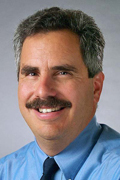 Professor of Astronomy
Professor of Astronomy
University of Wisconsin - Madison
Department of Astronomy
475 North Charter Street
Madison, WI 53706
Phone: 608-262-5679 ext. 3071
E-mail: mathieu@astro.wisc.edu
Bob Mathieu has been on the faculty of the Department of Astronomy of the University of Wisconsin-Madison since 1987. He was educated at Princeton University and the University of California at Berkeley, after which he became a fellow of the Harvard-Smithsonian Center for Astrophysics. He has served as president of the Board of Directors of the WIYN Observatory, and now chairs the University Committee of the University of Wisconsin-Madison. His research involves the formation and evolution of binary stars and the dynamics of star clusters. He also directs the NSF Center for the Integration of Research, Teaching, and Learning (CIRTL; http://www.cirtl.net), whose mission is to prepare STEM graduate students to be both forefront researchers and excellent teachers. He also is the principal investigator of an NSF project to upgrade the Student Assessment of Learning Gains (SALG) instrument.
Stephen L. Morgan
Professor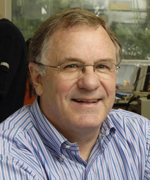
University of South Carolina
Department of Chemistry & Biochemistry
631 Sumter Street
Columbia, SC 29208
Phone: 803-777-2461
E-mail: morgan@mail.chem.sc.edu
Web: http://www.chem.sc.edu/faculty/morgan/
Stephen L. Morgan is a Professor in the Department of Chemistry & Biochemistry at the University of South Carolina (Columbia, SC). He received a B.S in Chemistry from Duke University (1971), and M.S. and Ph.D. degrees (1974, 1975) from Emory University. Research interests include forensic analytical chemistry (spectroscopy and separations for trace evidence such as fibers, dyes and inks, and biological residues), chemometrics, and polymer analysis by pyrolysis and spectroscopy. Dr. Morgan has coauthored over 125 publications and four books, including Experimental Design: A Chemometric Approach (1993) and Sequential Simplex Optimization for Quality & Productivity in Research, Development, and Manufacturing (1991). Dr. Morgan has taught over 550 short courses on experimental design and statistics for the American Chemical Society. Dr. Morgan has mentored the research of 40 graduate students; in 2007, he was named Distinguished Undergraduate Research Mentor, with over 80 undergraduates having worked in his laboratory.
Sharon L. Neal
Associate Professor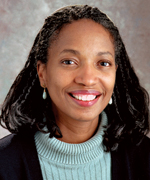
University of Delaware
Dept. of Chemistry and Biochemistry
Newark, DE 19716 United States
Phone: 302-831-0719
E-mail: sneal@udel.edu
Web: http://www.udel.edu/chem/sneal/sln_rsrch/sln_home.htm
Sharon L. Neal is an associate professor in the Chemistry and Biochemistry Department at University of Delaware. Prof. Neal is an analytical chemist focusing on the development of multivariate spectroscopic and data analysis tools for investigating the dynamic interactions of small molecules with the complex fluids encountered in biological, environmental and clinical systems. Her articles in these areas have been published in journals such as Analytical Chemistry, the Journal of Physical Chemistry and Analytica Chimica Acta. She earned the B.S. in Chemistry at Spelman College and the Ph.D. in Chemistry at Emory University, both in Atlanta, GA. She conducted post-graduate research at the University of Washington and Naval Research Laboratory. Before moving to U of DE in 1998, she was an Assistant Professor at UC Riverside and Spelman College. She also worked as a staff chemist at The Coca-Cola Company prior to completing her graduate degree.
Jessica M. Nuñez de Ybarra
Public Health Medical Officer III
California Department of Public Health
PO Box 367
Sacramento, CA 95812 United States
Phone: 916-650-6875
E-mail: jnunez2@cdph.ca.gov
Web: www.cdph.ca.gov
Dr. Núñez de Ybarra works at the State of California Department of Public Health in the Division of Communicable Disease Control in the Office of Workforce Development as a Public Health Medical Officer coordinating public health training and emergency preparedness activities and as the Division's liaison to the California Public Health Law Workgroup. She previously served as a Deputy Public Health Officer in Kern County Department of Public Health and as Director of its Office of Public Health Preparedness. She is presently a volunteer Assistant Clinical Professor at the University of California Davis (UCD) School of Medicine Department of Public Health Sciences. She has served as a lecturer in the UCD Chicano/a Studies Program. Jessica has her Medical Doctorate from the UCD and received her degree of Master in Public Health in Health Services Administration from the University of California, Los Angeles. She is Board Certified in Public Health and General Preventive Medicine. She lives in Sacramento, California with her husband Steven J. Ybarra, JD.
National Academy of Engineering -
Sigma Xi Lecturer
Lawrence T. Papay
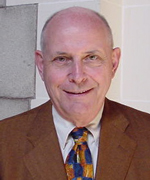 CEO and Principal of PQR, LLC
CEO and Principal of PQR, LLC
Phone: 858-362-0689
E-mail: lpapay@ix.netcom.com
Web: http://www.ccst.us/ccstinfo/board/
bios/papay.php
- Urban energy sustainability (P,G,S)
Papay is currently CEO and Principal of PQR, LLC, a management consulting firm specializing in managerial, financial, and technical strategies for a variety of clients in electric power and other energy areas. His previous positions include Sector Vice President for the Integrated Solutions Sector, SAIC where he was responsible for business dealing with the integration of technology in the energy, environment and information areas for a variety of governmental and commercial clients worldwide. Prior to joining SAIC, Larry was the Senior Vice President and General Manager of Bechtel Technology & Consulting and was responsible for monitoring new technologies and developing new businesses, principally in the energy sector, employing those technologies including technological developments that impacted existing business lines as well as the engineering and construction business in general. Prior to that he was a Senior Vice President at Southern California Edison where he had a variety of responsibilities over his 21-year career including R&D, Engineering, Power Operations (T&D), Power Generation, Nuclear Power, System Planning and General Administrative functions.
Papay received a B.S. in Physics from Fordham University in 1958, a M.S. in Nuclear Engineering from MIT in 1965, and a Sc.D. in Nuclear Engineering from MIT in 1969. He is a nationally recognized authority in engineering, science and technology. He is a member of the National Academy of Engineering and serves on its Board of Councilors. He also chairs the California Council for Science and Technology. He currently serves or has served on numerous special committees, panels, boards and task forces including the Department of Energy's Energy Research Advisory Board and the Laboratory Operations Board, the Department of Homeland Security's S&T Advisory Committee as well as the President's Council of Advisors on Science and Technology, National Science Foundation, National Research Council, American Nuclear Society, and Electric Power Research Institute. He is a registered Professional Engineer (Nuclear) in California. He served as CCST Council Chair from 2005 through 2008, after which he was appointed to the Board.
Lesley Reid
Associate Professor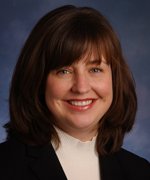
Georgia State University
P.O. Box 5020
Dept. of Sociology
Atlanta, GA 30302-5020
Phone: 404-413-6521
E-mail: lesleyreid@gsu.edu
Web: http://www2.gsu.edu/~wwwsoc/faculty/reid.html
Lesley Reid is Associate Professor of Sociology at Georgia State University. Her research integrates three areas of sociology: Criminology, urban sociology, and stratification. Across these areas, she uses the macro-level lens of global economic restructuring to understand micro-level behaviors such as criminal offending and drug use. Her current research includes (1) a four-decade study of the influence of immigration on crime across U.S. metropolitan areas; (2) an analysis of community and economic effects on drug use; and (3) an investigation of the use of recently popularized drugs, such as methamphetamine, in urban neighborhoods. Her research has been published in numerous journals including City and Community, Social Science Research, and Violence and Victims. She is author of the book, Crime in the City: A Political and Economic Analysis of Urban Crime (2003). Dr. Reid received her B.A. in 1993 from Wake Forest University and her PhD in 2000 from Tulane University.
Javier Rojo
Professor of Statistics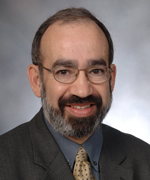
Rice University
Statistics Dept. MS-138
6100 Main Street
Houston, TX 77005
Phone: 713-348-2797
E-mail: jrojo@rice.edu
Javier Rojo grew up and attended high school in Juárez, México where he dreamt of becoming a professional baseball player. He attended the University of Texas at El Paso earning a degree in mathematics and a spot in the baseball team. He was selected to play at the Pan-American games in 1971. A career ending injury provided the opportunity to pursue graduate school. He obtained a master's degree from Stanford University and a PhD degree in statistics from The University of California at Berkeley under the direction of Erich L. Lehmann.
Dr. Rojo is Professor of Statistics at Rice University. He has held consulting positions at Pacific Gas and Electric in San Francisco, The Rand Corporation, Sandia National Laboratories in Albuquerque, The Department of the Interior, El Paso Natural Gas Company, and has collaborated with liver transplant surgeons from the Texas Children's Hospital in evaluating various methods for pediatric transplants. His research interests are in Nonparametric function estimation, survival analysis, microarray data, decision theory, extreme value theory, and partial orders of probability distributions.
Dr. Rojo has organized and chaired the Lehmann Symposia and is Director of the Rice University Summer Institute of Statistics (RUSIS). See, for example,http://www.stat.rice.edu/~jrojo/3rd-Lehmann/ and http://www.stat.rice.edu/~jrojo/RUSIS07.html
Both of these activities have the goal of providing a venue for theoretical statistics. The former at the professional level; the latter by developing human resources interested in pursuing graduate degrees in theoretical statistics.
Dr. Rojo has edited two volumes of research papers and has published close to fifty technical papers. He has been Statistics and Probability Program Director at NSF; has chaired the American Statistical Association Committee on Fellows; is an elected Fellow of the Institute of Mathematical Statistics, The American Statistical Association, The Royal Statistical Society, and the American Association for the Advancement of Science. In addition, he is an elected member of the International Statistical Institute, and has served in several National Academy of Sciences committees and NSF panels.
Francisco J. Samaniego
Professor of Statistics
University of California, Davis
Department of Statistics
One Shields Avenue
Davis, CA 95616 United States
Phone: 530-752-6490
E-mail: fjsamaniego@ucdavis.edu
Web: http://anson.ucdavis.edu/
faculty/Samaniego
Professor Samaniego received his Ph.D. in Mathematics from UCLA in 1971. After completing an NSF-sponsored postdoctoral fellowship at Florida State University, he joined the faculty at the University of California, Davis, in 1972. Dr. Samaniego's research interests include the areas of Mathematical Statistics, Engineering Reliability, Sampling Techniques and statistical applications to engineering and public health. He is an elected Fellow of the American Statistical Association, The Royal Statistical Society and The Institute of Mathematical Statistics and is an elected member of the International Statistical Institute. In 2002, Professor Samaniego was honored by the UC Davis Academic Senate with a Distinguisd Teaching Award, and in 2004, he was the seventeenth annual recipient of the UC Davis Prize for Undergraduate Teaching and Scholarly Achievement. In 2008, Dr. Samaniego received the U.S. Army Wilks' Award for pathbreaking work in the area of Reliability Theory.
American Meteorological Society -
Sigma Xi Lecturer
Melvyn A. Shapiro
span data-sfref="[images|OpenAccessDataProvider]ba3fc675-e293-6b72-a79c-ff000094a25f" class="sfImageWrapper">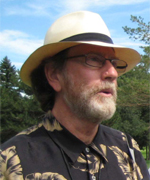 Research Associate
Research Associate
Cooperative Institute for Research in Environmental Sciences
University of Colorado
216 UCB
Boulder, CO 80309-0216
Phone: 303-497-8965
E-mail: mshapiro@ucar.edu
Dr. Melvyn A. Shapiro is a visiting scientist at the National Center for Atmospheric Research (NCAR) and a research associate the NOAA Cooperative Institute for Research in Environmental Sciences (CIRES) at the University of Colorado at Boulder. Shapiro also serves as an Associate professor at the University of Bergen, Norway.
He received his B.S. in Meteorology from Florida State University in 1962, followed by a Masters and Ph.D. from Florida State in 1964 and 1969. Shapiro has held several appointments with National Oceanic and Atmospheric Administration since receiving his Ph.D. and served as Director of Stratospheric Tropospheric Exchange Project, Atmospheric Chemistry and Aeronomy Division, National Center for Atmospheric Research (NCAR) from 1977 - 1981. He has served as a private consultant to NASA's Goddard, Langley and Lewis space flight centers providing support for satellite ozone measurements, CO2 laser systems and airline flight routing. Dr. Shapiro has also served as the Senior Meteorologist at NOAA's Environmental Tech Laboratory and the Office of Weather and Air Quality in Boulder, Colorado. He has more than 100 publications.
Dr. Shapiro has received numerous honors such as awards for Outstanding Publication from ERL (1977, 1981, 1986, 1987, 1988, and 1995). He is a member of the American Meteorological Society and was elected as a fellow in 1988. He has received the AMS Jule G. Charney Award and received the Department of Commerce Gold Medal. He has also been elected to membership in the National Academy of Science and Letter of Norway.
Vincas P. Steponaitis
Professor of Anthropology and Director of the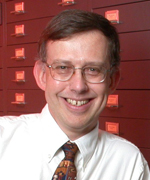 Research Laboratories of Archaeology
Research Laboratories of Archaeology
University of North Carolina at Chapel Hill
Research Laboratories of Archaeology
Chapel Hill, NC 27599-3120
Phone: 919-962-3846
E-mail: vin@unc.edu
- The Meaning of Mississippian Palettes (S)
Vincas Steponaitis (A.B., Harvard University 1974; Ph.D., University of Michigan 1980) is Professor of Anthropology and Director of the Research Laboratories of Archaeology at the University of North Carolina at Chapel Hill. His archaeological research interests focus on the precolonial Indian cultures of the American South, the development of chiefdoms, and the analysis of ancient ceramics. In addition to numerous articles, his books include Ceramics, Chronology, and Community Patterns: An Archaeological Study at Moundville (Academic Press, 1993), and Archaeology of the Moundville Chiefdom (co-edited with Vernon J. Knight, Smithsonian Institution Press, 1998). He has served as board chairman of the Archaeological Conservancy, president of the Society for American Archaeology, editor of the scholarly journal Southeastern Archaeology, and on numerous other professional boards and committees.
Robert Strongin
Professor of Chemistry
Portland State University
1719 SW 10 AVE, SB 2
PORTLAND, OR 97217 United States
Phone: 503-725-9724
E-mail: robert.strongin@gmail.com
Web: http://www.chem.pdx.edu/people/
faculty_pages/strongin.php
Dr. Robert M. Strongin is a Professor of Organic Chemistry in the Department of Chemistry at Portland State University. His expertise is in physical organic and synthetic organic chemistry. He specializes in the design and evaluation of new redox and chromophore materials which serve as selective probes and chemosensors to address challenges in materials, bioorganic and biomedical science. Dr. Strongin began his independent career at Louisiana State University where he was named Philip and Foymae Kelso West Distinguished Professor in Chemistry. He was the founding Director of the LSU Initiative for Maximizing Student Diversity Program for training underrepresented groups in biomedical research. Professor Strongin has garnered several research and teaching awards throughout his career. In addition to directing an internationally recognized, highly interdisciplinary research program, he regularly serves on federal and private foundation proposal review panels, scientific advisory and editorial boards, and as a consultant to industry.
Emily A. Tobey
Professor and Nelle C. Johnston Chair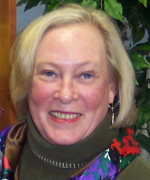
University of Texas at Dallas
Callier Advanced Hearing Research Center
1966 Inwood Road
Dallas, TX 75235
Phone: 214-905 3105
E-mail: etobey@utdallas.edu
Web: dcip.org
Dr. Emily Tobey is Professor and Nelle C. Johnston Chair in Early Childhood Communication Disorders at the University of Texas at Dallas. She heads the Dallas Cochlear Implant Program and was named the Polykarp Kusch Lecturer for UT Dallas, the highest honor granted by the University to an individual faculty member. Additional honors include Summer Distinguished Lecturer-in-Residence at Texas Woman's University; Distinguished Academy Scientist, Louisiana Academy of Sciences; Fellow of the American Speech-Language and Hearing Association and Acoustical Society of America; Visiting Scholar at the Australian Bionic Ear and Hearing Research Institute; and Visiting Research Professor at the University of Montpellier. She has delivered the Marjorie Sherman Memorial Lecture, University of Nottingham; the Graham Fraser Memorial Lecturer at Royal Academy of Medicine in London, England and the keynote address at the Nalli-Ingolia Symposium, Toronto, Canada. She has published over 100 peer-reviewed articles involving cochlear implants.
Robert H. Tykot
Professor of Anthropology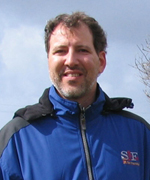
University of South Florida
Department of Anthropology
4202 E. Fowler Ave., SOC 107
Tampa, FL 33620
Phone: 813 974-7279
E-mail: rtykot@cas.usf.edu
Web: http://shell.cas.usf.edu/~rtykot
- Sardinia in the Mediterranean (P,G,S)
Robert H. Tykot, Professor of Anthropology at the University of South Florida, received a BS in Archaeology and Chemistry (1983) and an MA in Classical Archaeology from Tufts University, and an MA (1993) and PhD (1995) in Anthropology from Harvard University. His research emphasizes scientific analysis of archaeological materials, especially elemental and isotopic studies, to investigate trade, technology, and dietary patterns in many parts of the world, including Algeria, Argentina, Belize, Bolivia, Chile, China, Cyprus, Ecuador, Egypt, France, Greece, Guatemala, India, Italy, Malaysia, Mexico, Peru, Romania, Tunisia, Turkey, South Africa, Sweden and the United States.
For 25 years, he has worked on obsidian in the central Mediterranean, including a recent survey and analysis of the obsidian sources on Sardinia, Lipari, Palmarola and Pantelleria and of artifacts found at Neolithic archaeological sites throughout the region. Professor Tykot has also conducted excavations at a Bronze Age site in Sardinia where a metal workshop was discovered, and a survey and excavation at Sennixeddu in Sardinia, a large obsidian quarry and workshop area. At the same time, his expertise in isotopic analysis of skeletal remains led to studies of fishing practices in coastal Italy, and of maize agriculture in New World societies. These projects have included analyses of South American mummies to look at seasonal variation in diets; differences based on social status in Mesoamerica; and the importance of marine resources in Florida.
Professor Tykot is the author or coauthor of more than 100 books, articles, and other scholarly publications, and has given more than 50 public lectures. He is a board member or reviewer for many scientific journals and grant agencies, and is an active member in more than a dozen national and international societies and organizations. His website may be found by searching Google for "tykot" or "bone chemistry" (http://shell.cas.usf.edu/~rtykot/)
Lawrence J. Wangh
Professor of Biology
Brandeis University
20 Duffield Road
Auburndale, MA 02466 United States
Phone: 781-736-3110
E-mail: wangh@brandeis.edu
Web: LATE-PCR.ORG
I received my Ph.D. from Rockefeller University in 1973 and returned to my undergraduate alma mater, Brandeis University in 1977 after four years of post-doctoral in England. For 25 years I taught and investigated aspects of the cell nucleus, developmental biology, and human reproductive. In 1997 I and my laboratory colleagues decided to enter the field of molecular diagnostics. Several serendipitous discoveries lead us to invent LATE-PCR, an advanced form of asymmetric PCR, as well as several other related chemistries. These platform technologies provide the basis for improved diagnostics in many fields because they generate more information and are quantitatively more accurate than conventional PCR. Some members of my laboratory are currently working in veterinary medicine to develop tests for Foot and Mouth Disease and Avian Influenza, while others are working in human medicine to develop sophisticated tests for hospital acquired infections (MRSA), multi-drug resistant tuberculosis (MDR-TB), and the side effects of treating HIV patients with nucleic acid analogues. Additional projects are related to stem cell research and early detection of cancer. We are now working in close collaboration with a biotechnology company with the intention of moving our science from the bench-to-the-bedside as quickly as possible. The past five year have been a thrilling global adventure comprised of discovery, invention, new learning, business, travel, and building collaborations. My major task in the next five years is to teach about our discoveries as widely as possible. I therefore look forward to sharing my experiences as a Sigma Xi Distinguished Lecturer.
National Cancer Institute -
Sigma Xi Lecturer
Alissa Weaver
 Assistant Professor
Assistant Professor
Vanderbilt University
771 Preston Research Building
Dept. of Cancer Biology
Vanderbilt University Medical Center
Nashville, TN 37232 United States
Phone: 615-936-3529
E-mail: alissa.weaver@vanderbilt.edu
Web: http://people.vanderbilt.edu/~alissa.weaver/
Dr. Alissa Weaver is an Assistant Professor of Cancer Biology at Vanderbilt University. She earned her B.S. and B.A. from Stanford University in 1991 and M.D./Ph.D. degrees from the University of Virginia in 1998. Following a postdoctoral fellowship in Cell Biology and Clinical Pathology residency at Washington University in St. Louis, she was recruited to Vanderbilt in 2003. The overall goal of her research is to understand mechanisms of tumor progression. The laboratory has a particular focus on the role of cytoskeletal rearrangements in promoting tumor invasion and metastasis. Current research projects include 1) how invadopodia, specialized subcellular structures used for cancer invasion, are formed and function in cells; 2) the role of actin assembly molecules in membrane trafficking and tumor progression; 3) integration of experimental data into mathematical models of tumor progression. You can access the Weaver Lab home page by going tohttp://people.vanderbilt.edu/~alissa.weaver/.
Society for Risk Analysis -
Sigma Xi Lecturer
Felicia Wu
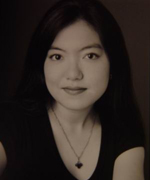 Assistant Professor
Assistant Professor
Department of Environmental and Occupational Health
University of Pittsburgh
Bridgeside Point
100 Technology Drive
Room 560, BRIDG
Pittsburgh, PA 15219-3130
Phone: 412-624-1306
E-mail: fwu@eoh.pitt.edu
Web: http://www.pitt.edu/~few8/
- Indoor Air and Health Impacts (P,G)
Dr. Wu ends her term on December 31, 2009.